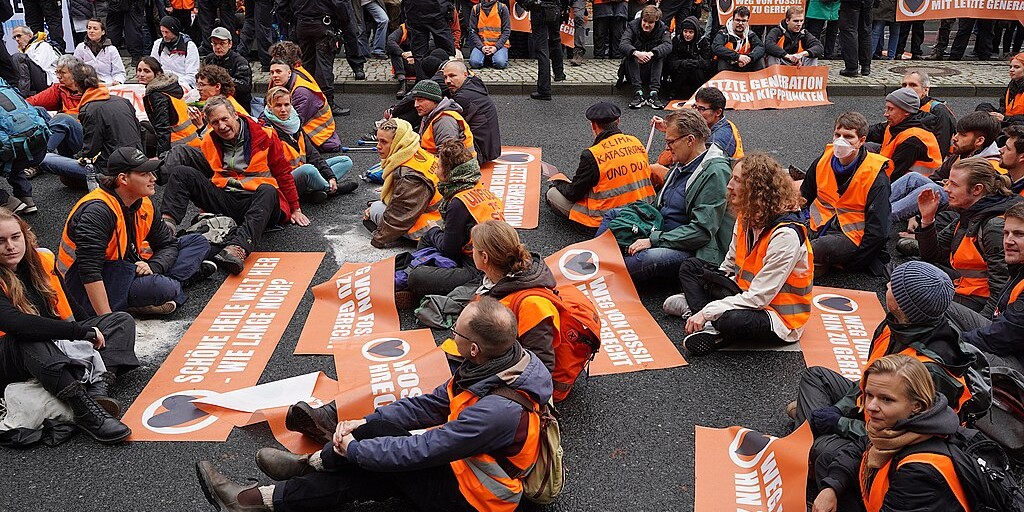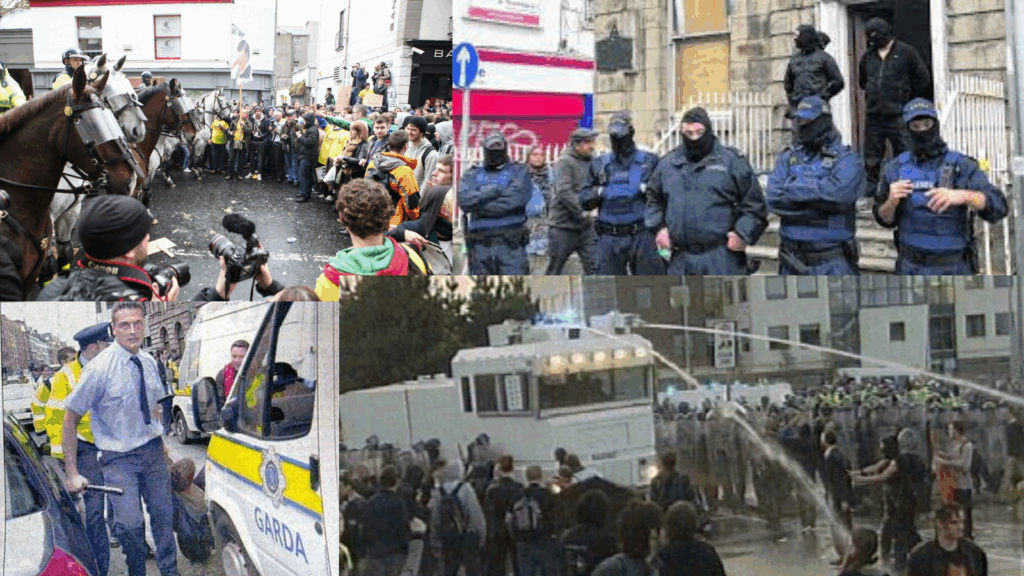
Introduction
Where An Garda Síochana (Ireland’s police force) choose to engage, and how they deploy their resources, often reveals where power in Irish society resides. Thinking of their policing of past protests, infamous images like an baton-wielding officer dragging a student fees protestor in 2010 or the response to the May Day anti-globalisation protests in 2002 come to mind. Both resulted in accusations of police brutality and compensation claims being paid out.

On the other hand, the Gardaí can also take a more light-touch approach. This was evident in their response to a violent eviction on North Frederick Street in 2018, and many subsequent violent evictions. We see it daily with vehicular-based offenses, which have the potential of serious harm and death, yet pass unsanctioned. Where you are in society’s pecking order often dictates the attention you get from police.
New Public Order Legislation
Last week, I attended a seminar organised by UCD School of Law on the the policing of housing rights activism in Ireland, particularly in relation to anti-eviction protests. It was a fascinating piece of work outlining the consistent An Garda Síochana refrain of “this is a civil matter.” This simple phrase justified non-engagement with hired thugs; their lack of understanding of public order law; and willing to defer to the powerful, in this case, the owners of property regardless of the violence being exacted on tenants.
During the week, news emerged that Gardaí will be able to require a protestor to remove a face covering if they suspect it is being worn to conceal their identity or intimidate others under new legislation. The provision would provide gardaí with the legislative basis to remove or seize the face-covering, without a warrant.
In a helpful thread by Dr Cian Ó Concubhair on the new prospective powers under public order law, he made a distinction between unlawful and lawful conduct. For those engaged in violent acts while wearing balaclavas, the Gardaí “already have powers if they observe or reasonably suspect something along those lines.” But he suggests that the proposed power is “far more likely to be used against people engaging in lawful conduct (incl protest).” Ultimately, Ó Concubhair concludes that the primary effect of this new law is the creation of “near-absolute discretion” for Gardaí in relation to people wearing face-coverings in any context; and the lower courts where these case may be heard are “not interested in scrutinising the reasonableness of Garda suspicion.”
“Crimes” of the Future
“Crime” or what is categorised as a crime is not an objective reality. Its definition is continuously changing and mutating; shaped by Government formation, political priorities, media coverage, or the success of advocacy groups. The only consistency is the selectivity expressed in Jonathan Swift‘s famous aphorism that “[l]aws are like cobwebs, which may catch small flies, but let wasps and hornets break through.” Laws typically punish low-level offending but those with power and influence can easily slip through the net of accountability.
What this means is that laws or additional police powers which are granted today, under the justification of a present issue, still remain on the statute books and can be utilised in the future against offenses not yet defined. If a more populist right Government, than the incumbent coalition, were to emerge in Ireland, then they have an arsenal of tools to further suppress peaceful democratic protest and respond punitively to protestors.
Why is this important and should we be concerned?
We are entering decades of increased war and genocide, and climate breakdown. At present, Ireland is going to miss its 2030 greenhouse emissions targets by a massive 57%, and continues to speak out of both sides of its mouth on the ongoing genocide in Gaza. If the Government fail to act on these existential issues, what recourse is left to its citizens but sustained protest and civil disobedience?
The United Kingdom, often the precursor or catalyst of any policy change in Ireland, has severely clamped down on protests, civil disobedience, or even the planning of collective action. For only conspiring to take direct action on a motorway, five Just Oil protestors received sentences of between four and five years. Over last Christmas, there were over 40 protestors in prison, who had taken part in climate and Gaza protests.
In March, six female members of the environmental activist group, Youth Demand, were arrested after more than thirty police officers, equipped with tasers, stormed a Quaker meeting house in London. They arrested on suspicion to cause a public nuisance. The Society of Friends provided a strong statement in the aftermath, decrying that “the forceful removal of young people holding a protest group meeting clearly shows what happens when a society criminalises protest.” While later released without charge, this police response may have been designed to have a chilling effect on future groups, rather than convicting a few individuals.
Conclusion
In early April, a Jesuit priest Jörg Alt, SJ began a 25-day prison sentence for taking part in a street blockade by climate activists in the German city of Nuremberg. He choose to go to prison rather than pay a €500 fine. Prior to committal, he said that “I don’t like doing this, especially as my health is no longer the best at the age of 63. But I see no alternative, because it’s the last form of protest I have left in this specific case to draw attention to important issues.”
In Ireland, those involved in campaigning against crises, which will intensify in coming decades, need to be mindful of the expansion of policing powers and growing prisons in the present. When those with power, property and business feel threatened in the future by climate protestors or anti-war activists, it is naïve to think that their gaze will not be turned to new threats.
While the wasps and hornets will continue to pass untouched, more may find themselves as flies getting tangled in the cobweb.

